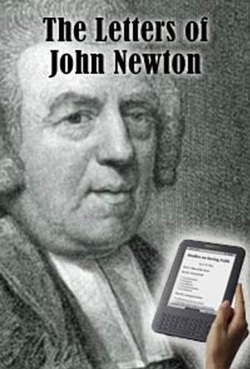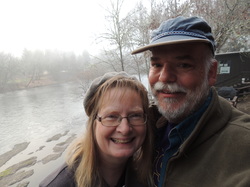 John Newton wrote this letter to a fellow minister who had written about his plan to write an article criticizing another minister on some point of disagreement over theological matters. Within Newtons answer to this man are hidden some insights into what Calvinists believe. BUt more it is a great treasure about how to handle people with whom we disagree; not only with fellow believers but also with those who are not of Christ. First a little bit about John Newton. He was born in 1725 and died in 1807. Newton was an English sailor who at a young age became involved in the slave trade. After accepting Jesus Christ as his Lord and Savior he became a clergyman, hymn writer, and a prominent supporter of the abolition of slavery. He is perhaps best known for one of the hymns he penned...Amazing Grace. Now on to John Newton's Letter On Controversy.
Newton begins by addressing how to approach the "opponent." He begins by encouraging prayer for the person with whom we have the disgreement. "I wish that before you set pen to paper against him, and during the whole time you are preparing your answer, you may commend him by earnest prayer to the Lord’s teaching and blessing. This practice will have a direct tendency to conciliate your heart to love and pity him; and such a disposition will have a good influence upon every page you write." Imagine that. Through my recent meditations on Psalm 119 I have been praying for the Lord to teach me-it is just as important to pray the same for others. Too often when I approach a disagreement I am more intent on being right, proving my point, but the Great persuader is God Himself not me. I may be an instrument, but that is all. If anyone is going to be won over to God's side it is God Himself who will do the winning. (And by implication of all of this I have spent time in prayer to be sure that I am indeed on the right side of the issue myself, not because I believe so by my own wit, but because God's Word and testimonies prove it out.) I underlined this final thought from Newton on what our attitude should be as we approach a fellow believer we disagree with and desire to correct "though you may find it necessary to oppose his errors, view him personally as a kindred soul, with whom you are to be happy in Christ forever." Newton was directing his reader to that great and glorious future when we will get to heaven. I have seen some pretty ugly church splits that make you wonder if either side remembered that- or even gave it much thought. Too often in our desire to be right we vilify our opponent and oh how this must grieve the Lord's heart. Newton then goes on to address the issue of dealing with controversy with a non-believer- someone "in a state of enmity against God and His grace." He first of all admonishes that if you are not absolutely sure about the persons standing you should be unwilling to identify them as such. I have heard many, many conservative Christians of late calling fellow believers all sorts of names and questioning their position before God becuase they do not share the same beliefs, this is exactly the kind of behavior Newton is warning against. Only when the evidence supports such a conclusion without question is the judgement just. But the evidence must be very clear and stand up in a court of law so to speak, not the court of opinion. Having determined the person to be an unbeliever Newton makes this statement, "he is a more proper object of your compassion than of your anger. Alas! 'He knows not what he does.'" Because the Calvinist believes that we are not Christians by our own choosing, but rather because God has predestined us to believe, He chose us for Himself and so we can look upon the non-believer with great compassion and humility. They are not in that place because of their choice, but rather because God has not yet called them to Himself. This is one of the great problems people wrestle with in the Calvinist view-Predestination. (John 6:44; Romans 8:29-30;Ephesians 1:4-5; 2 Thessalonians 2:13; 1 Peter 2:9) How can a god who is kind and good not save everyone? Why are there only some who are the elect; the chosen? If He desires that not anyone should be lost why doesn't He just save us all from death and hell? Those are all very good questions. Nevertheless, that being the case for those who are called Calvinists, of which John Newton was one, then this is what follows when we are faced with controversy with a non-believer that we should not be argumentative and ugly, but rather with meekness seek to instruct. If our purpose becomes to instruct in this manner we will be careful not to become stumbling blocks for those whose eyes have yet to be opened. Bearing in mind that they are the blind referred to in Scripture. We need to be careful also not to inflame them with our language. (Does that ring any bells for you?) They may wish us a Happy Holidays but if we jump all over them for it rather than respond gently in kind we have in no way glorified God through our actions. That clerk in the store is not the enemy and should not be treated as such. Over and over God's word admonishes us to be gentle, to live at peace, to love others and count them as better than ourselves- instead we get our hackles up and pounce like mad dogs. And what about that person who lives a lifestyle contrary to what God has said, what about the homosexual, the liar, the person "living in sin", the democrat, the liberal, the fan of the new Star Trek movie? We are to have compassion for them as well. We should be praying for their eyes to be open and their hearts to be softened so that they too may believe on the Lord Jesus Christ and be saved. God so loved the world that He gave His only Son that whosever believes in Him should not perish but have everlasting life-if God so loved the world how can I do anything less? Blessings! Deb
1 Comment
Jean Wilson
11/23/2013 07:13:35 am
Thanks.
Reply
Leave a Reply. |
AuthorI am a wife, a mother, a quilter, and most of all a follower of Jesus Christ. Join me on facebookFollow me on TwitterCategories
All
Archives
March 2016
|




 RSS Feed
RSS Feed